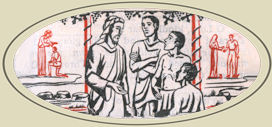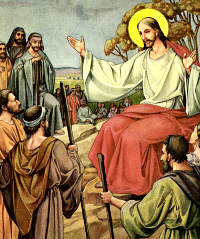» Enjoy our Liturgical Seasons series of e-books!
Jesus said to his disciples: “Do not think that I have come to abolish the law or the prophets. I have come not to abolish but to fulfill. Amen, I say to you, until heaven and earth pass away, not the smallest letter or the smallest part of a letter will pass from the law, until all things have taken place.
Click here for commentary on the readings in the Extraordinary Form of the Roman Rite.
Sunday Readings
The first reading is taken from Sirach 15:15-20. Today's reading comes from the section of Sirach's writing on man's free will and responsibility.
The second reading is from St. Paul 1 Corinthians 2:6-10. Last week we heard Saint Paul address how his preaching illustrates the fact that man's strength and wisdom are nothing compared to those of God. Today we hear him tell of the true wisdom of God.
The Gospel is from St. Matthew 5:17-37. In this Sermon on the Mount, we have various sayings of Christ, actually spoken on different occasions. Matthew, in his systematic manner, has gathered these sayings into one continuous discourse here. This makes it easier for his readers, who were Jewish converts, to grasp the new order of salvation as inaugurated by Christ. They knew the ten commandments, but they knew them as their rabbis had taught them. These rabbis, for the most part Pharisees, put all the stress on the letter of the law and on its external observance. Christ's opening statement, that the attitude of his followers towards the commandments (and other precepts of the law) must be different, and superior to that of the scribes and Pharisees, clearly indicates how Christianity must differ from, and supersede, Judaism.
Christ is not abolishing the ten commandments, but he is demanding of his followers a more perfect, a more sincere, fulfillment of them. The whole moral value of any legal observance (the Mosaic law included), comes from the interior disposition of him who observes or keeps the law. No man serves or honors God by any exterior acts, be they ever so arduous or continuous, unless these acts proceed from an intention and a will to honor and please God. This is the charter, the constitution, of the new law, Christianity. The old law is not abolished, but deepened and given a new life.
Avoiding murder therefore is not enough; the true Christian must remove any inclination to murder by building up true, brotherly love for all men in his heart.
We must not only not injure our neighbor or fellowman in his person, or in his character, but we must be ever ready to help him and prevent injury to him, whenever and wherever we can. We must not only not commit adultery, but must also develop a Christian respect and esteem for purity, the virtue which will preserve us not only from adultery but even from thoughts of adultery, or any other abuse of our sexual gifts given us by God for his sublime purpose.
We must be truthful always, and men of our word. This virtue is not only necessary for man's salvation, but is the basis of rational intercourse between men in civilized society. While our civil courts still deem it necessary to impose oaths on contestants and witnesses (since they have, unfortunately, to take account of the liars and deceivers who still are a menace to society), the truthful man need not be afraid of insulting or dishonoring God by calling him as his guarantor, if asked to do so.
True and loyal service of God therefore begins in the heart and has its value from this interior disposition. Keeping the ten commandments is our way of proving to God that we are grateful, obedient and loyal to him who gave us all we have and who has promised us future gifts infinitely greater still. And just as our love for God is proved by our true love for our neighbor, so the last seven of the commandments impose on us obligations regarding our neighbor. It is only by fulfilling these seven that we can fulfill the first three which govern our relations with God.
This truth is expressed by our Lord in the words: It you are offering your gift at the altar, and remember that your brother has something against you, leave your gift there . . . first be reconciled to your brother and then come and offer your gift.
— Excerpted from The Sunday Readings Cycle A, Fr. Kevin O' Sullivan, O.F.M.
Commentary for the Readings in the Extraordinary Form:
Septuagesima Sunday
 "Why do you stand here all day idle? . . . Go you also into the vineyard" (Gospel).
"Why do you stand here all day idle? . . . Go you also into the vineyard" (Gospel).
As athletes of Christ we are called to a competitive "race" (Epistle). As workers with Christ we are ordered into the "vineyard" (Gospel).
It is a "race" with death for the "prize" of life eternal. Only "one receives the prize" by His own right, Christ! But, remember, He still runs in us if we do not lag in this "race," as did Israel under "Moses" (Epistle).
God comes to us "early" in life. Unitl the last "hour" He repeats, "Why . . . stand . . . idle?" Each "hour" brings us nearer to the "evening" of reward, not due to the excellence of our work in itself but mercifully given by God as a recompense (Gospel).
— Excerpted from My Sunday Missal, Confraternity of the Precious Blood






